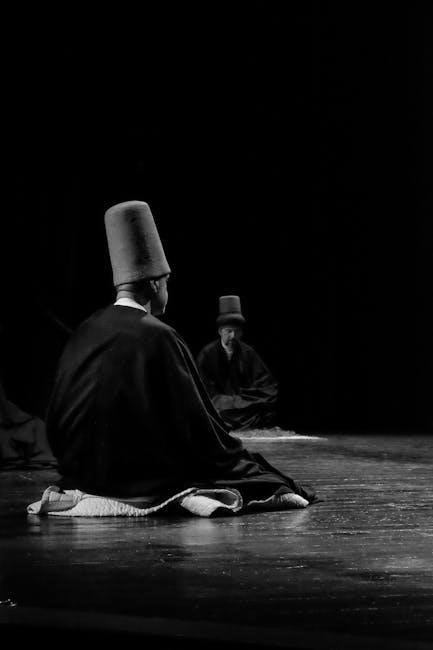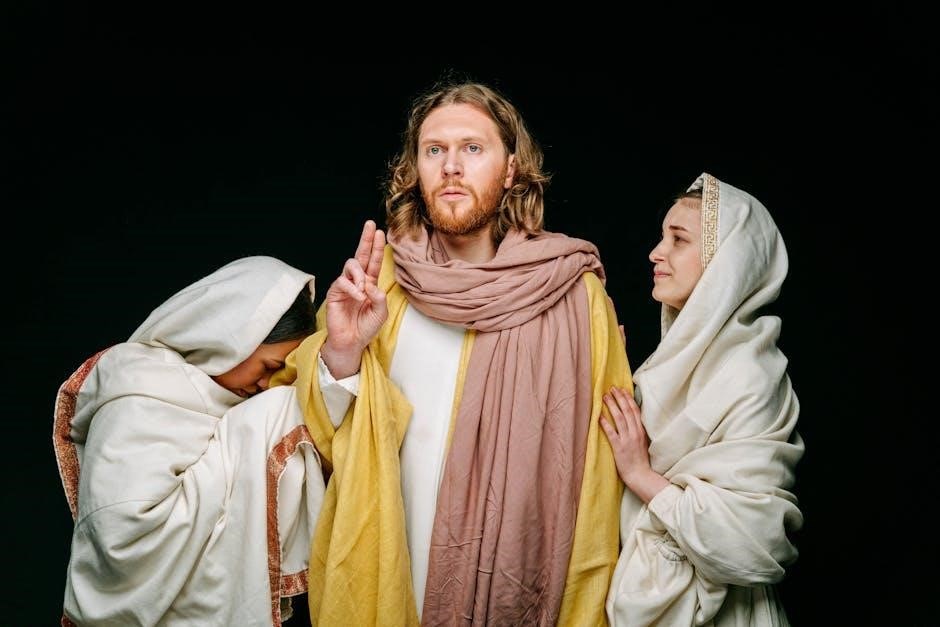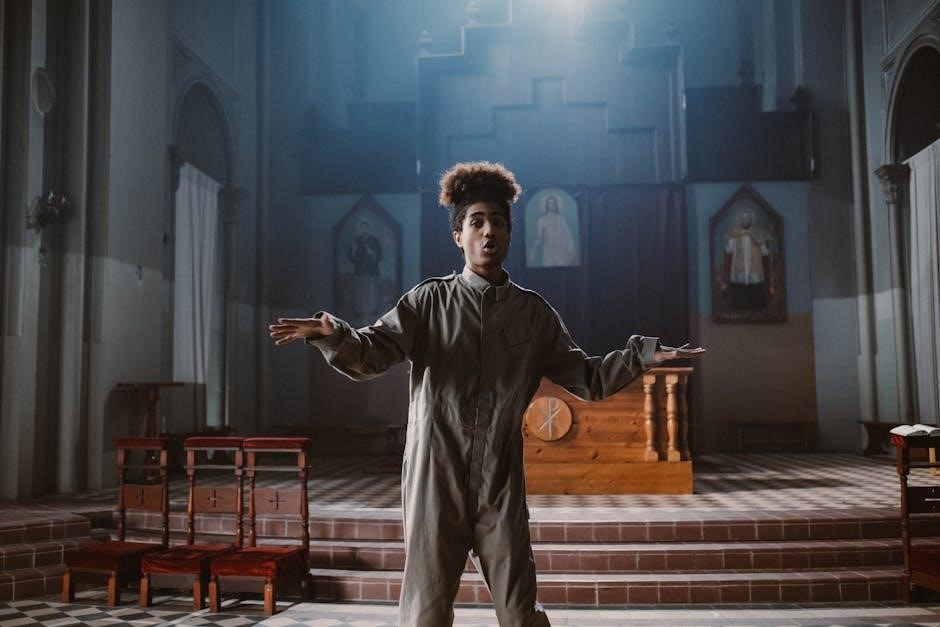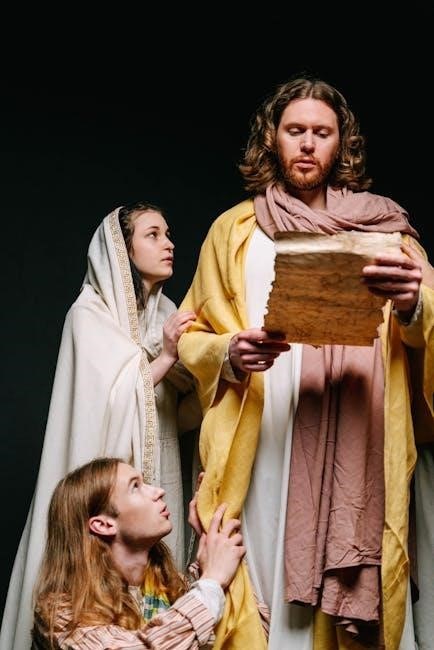James Fowler’s Stages of Faith outlines six developmental phases, blending psychology, education, and spirituality, offering a comprehensive framework for understanding belief systems and personal spiritual evolution.
1.1 Overview of the Theory
James Fowler’s Stages of Faith theory proposes six developmental stages of faith, influenced by Jean Piaget and Lawrence Kohlberg. The stages—ranging from primal trust to universalizing faith—offer a framework for understanding spiritual growth. This theory applies to diverse belief systems, providing insights into personal and societal faith development. Fowler’s work bridges psychology and spirituality, offering a structured approach to understanding belief systems.
1.2 Importance of Faith Development
Faith development, as outlined in Fowler’s theory, plays a crucial role in shaping individual and collective identity. It influences moral reasoning, emotional resilience, and interpersonal relationships. By understanding these stages, individuals can gain insights into their spiritual journeys, fostering personal growth and empathy. Fowler’s framework also aids educators and religious leaders in nurturing faith development across diverse contexts, emphasizing its universal relevance in human life.
1.3 Fowler’s Inspiration from Piaget and Kohlberg
James Fowler drew inspiration from Jean Piaget’s cognitive development stages and Lawrence Kohlberg’s moral development theory. Piaget’s structural approach to thinking influenced Fowler’s faith stages, while Kohlberg’s moral reasoning provided a framework for understanding ethical growth. This integration allowed Fowler to create a comprehensive model, blending psychological and spiritual dimensions, offering a unique perspective on how faith evolves through structured, progressive stages.

The Six Stages of Faith Development
James Fowler’s theory outlines six stages of faith development, describing how individuals’ understanding of spirituality evolves from infancy through adulthood; Each stage reflects unique ways of connecting with the divine.
2.1 Stage 0: Primal Undifferentiated Faith
Stage 0, Primal Undifferentiated Faith, occurs from birth to age 2. It focuses on trust and sensory experiences, laying the groundwork for future faith development. Inspired by Erik Erikson, this stage emphasizes basic trust and mutuality, where infants develop a sense of security or mistrust based on their environment. It underlies all subsequent faith stages, highlighting the importance of early relational experiences in shaping spiritual growth.
2.2 Stage 1: Intuitive-Projective Faith
Stage 1, Intuitive-Projective Faith, typically occurs between ages 3 and 7. Children at this stage use intuition and imagination to interpret religious concepts, often blending fantasy and reality. They imitate adults’ faith expressions and are deeply influenced by stories, emotions, and examples from trusted figures. This phase is marked by a fluidity of thought, where symbolic language and metaphor are not yet differentiated from literal meaning, shaping their initial understanding of faith and spirituality.
2.3 Stage 2: Mythic-Literal Faith

Stage 2, Mythic-Literal Faith, emerges in childhood, where individuals begin to interpret stories and beliefs through a literal lens; Children at this stage retell stories but struggle to distinguish between literal and figurative meanings. This phase is marked by the adoption of community beliefs, whether religious or secular, and a reliance on concrete narratives to understand the world. While typical for elementary-aged children, some adolescents and adults may remain in this stage, shaping their faith through shared stories and literal interpretations of teachings.
2.4 Stage 3: Synthetic-Conventional Faith
Stage 3, Synthetic-Conventional Faith, typically emerges during adolescence. At this point, individuals begin to integrate their beliefs into a cohesive system, often conforming to societal or religious expectations. They synthesize various influences to form a unified identity, adopting norms and values without deep critical reflection. This stage is marked by a focus on group identity and external authority, providing a sense of belonging and stability. It lays the groundwork for future spiritual growth but lacks the depth of personal reflection seen in later stages.
2.5 Stage 4: Individuative-Reflective Faith
Stage 4, Individuative-Reflective Faith, marks a significant shift as individuals transition from conforming to external norms to forming their own beliefs. Typically emerging in young adulthood, this stage involves personal reflection and critical thinking, leading to a deeper, more authentic faith. Individuals may experience identity crises as they reconcile their experiences with inherited teachings, fostering empowerment and unsettling self-discovery. This stage emphasizes taking ownership of beliefs, moving from external group-oriented faith to internal personal conviction; It requires emotional and intellectual maturity, often leading to strained relationships with those in earlier stages but also forming new connections with like-minded individuals. The process varies across cultural and religious contexts, yet universally represents a pivotal step toward autonomy and authenticity in faith development.
2.6 Stage 5: Conjunctive Faith
Stage 5, Conjunctive Faith, represents a synthesis of early beliefs with new insights, fostering a deeper understanding of paradox and mystery. Individuals in this stage often reconcile contradictions, blending different spiritual traditions while maintaining a sense of unity. This stage is rare and typically appears in later adulthood, requiring a high level of self-awareness and emotional intelligence. It emphasizes harmony and the interconnectedness of all things, leading to a compassionate and inclusive worldview. This stage is characterized by a return to the richness of early traditions but with a mature, reflective perspective.
2.7 Stage 6: Universalizing Faith
Stage 6, Universalizing Faith, is the rarest and most advanced phase, characterized by a profound sense of unity with all existence. Individuals transcend conventional religious boundaries, embracing a global, compassionate perspective. This stage involves a deep commitment to justice, love, and the well-being of all humanity. It often manifests in prophetic or visionary leadership, challenging systems of oppression and promoting universal values. Few reach this stage, but those who do embody a selfless, altruistic faith that transcends specific traditions, focusing on the common good and the interconnectedness of all life.
Applications of Fowler’s Theory

Fowler’s theory is widely applied in personal spiritual growth, religious education, and psychological studies, offering insights into faith development and its role in shaping individual and societal behavior.
3.1 Personal Spiritual Growth
James Fowler’s Stages of Faith provides a framework for understanding and nurturing personal spiritual growth. By identifying one’s current stage, individuals can engage in self-reflection and intentional practices to deepen their faith. This theory encourages embracing transitions, fostering resilience, and exploring new dimensions of spirituality. It empowers individuals to move beyond rigid beliefs, cultivate empathy, and integrate their faith into daily life, leading to a more authentic and meaningful spiritual journey.
3.2 Religious Education
James Fowler’s Stages of Faith offers valuable insights for religious education, helping educators tailor their approaches to students’ developmental levels. By understanding these stages, teachers can design age-appropriate lessons, fostering deeper spiritual understanding. For example, storytelling and rituals are effective for younger stages, while older students benefit from reflective discussions and ethical explorations. This framework ensures religious education is meaningful, fostering a lifelong journey of faith exploration and growth.

3.3 Psychological and Sociological Insights
James Fowler’s Stages of Faith provides profound psychological insights into how individuals develop belief systems, mirroring cognitive and moral development theories. Sociologically, it highlights how cultural and communal influences shape faith, offering a framework to understand collective spiritual trends. This theory bridges individual and societal dimensions, aiding in counseling, education, and interfaith dialogue, while fostering empathy for diverse belief systems in an increasingly pluralistic world.

Criticisms and Limitations
Fowler’s theory faces criticism for its linear progression, overlooking cultural variations and individual uniqueness. Some argue the stages are too rigid, failing to account for diverse spiritual experiences and non-religious worldviews.
4.1 Cultural and Individual Variations

Fowler’s theory has been critiqued for its potential oversight of cultural diversity and individual differences. While the stages aim to be universal, they may not fully account for varied spiritual practices, beliefs, or values across different cultures. For instance, collectivist societies might emphasize communal faith experiences, whereas individualist cultures focus on personal spirituality. Additionally, some argue that the theory may not adequately address non-religious or secular worldviews, limiting its applicability to diverse populations. These critiques highlight the need for a more inclusive approach to faith development frameworks.
4.2 Linear vs. Non-Linear Development
Fowler’s stages are often viewed as a linear progression, implying a sequential movement from one stage to the next. However, critics argue that faith development can be non-linear, with individuals oscillating between stages or experiencing regression. Real-life experiences, such as crises or significant life events, may cause individuals to revisit earlier stages or even skip certain phases. This critique suggests that the theory oversimplifies the complexity of personal spiritual journeys, which can be more fluid and dynamic than a rigid linear model allows.
4.4 Religious vs. Secular Worldviews
Fowler’s stages primarily focus on religious faith, potentially overlooking the spiritual journeys of those with secular worldviews. Critics argue that the theory may not fully address how individuals with non-religious beliefs navigate moral and existential questions. While the stages can apply to secular perspectives, the emphasis on religious frameworks may limit their universal applicability. This raises questions about the inclusivity of the model in diverse cultural and philosophical contexts.
Fowler’s stages provide a valuable framework for understanding faith development, bridging psychology and spirituality, and remain influential despite critiques, encouraging deeper personal and communal reflection.
5.1 The Legacy of Fowler’s Work
James Fowler’s Stages of Faith has left an enduring impact on psychology, education, and spirituality. His theory, inspired by Piaget and Kohlberg, offers a timeless framework for understanding faith development. The book remains a cornerstone for scholars and practitioners, providing insights into personal and communal growth. Fowler’s work bridges diverse worldviews, making it universally applicable. The availability of his work in PDF formats ensures its accessibility, fostering continued exploration and reflection on faith’s role in human life, solidifying his legacy as a pioneer in faith development theory.
5.2 Encouragement for Further Exploration
Exploring James Fowler’s Stages of Faith invites deeper self-reflection and understanding of spiritual growth. Readers are encouraged to engage with his theory by accessing the PDF version of his book, which offers a detailed journey through the six stages. This exploration can illuminate personal beliefs, foster empathy, and enrich discussions in both religious and secular contexts. Embracing Fowler’s work inspires individuals to consider their own faith journey, promoting lifelong learning and spiritual development in an ever-evolving world.

Availability of ‘Stages of Faith’ in PDF
The PDF version of James Fowler’s Stages of Faith is accessible online through platforms like the Internet Archive and other digital libraries, ensuring widespread availability for readers worldwide.

6.1 Sources for the PDF Version
The PDF of James Fowler’s Stages of Faith is widely available online. Platforms like the Internet Archive and digital libraries offer free access to the book. Additionally, websites such as Bookey and academic databases provide downloadable versions. Readers can easily locate these sources through search engines, ensuring convenient access to Fowler’s groundbreaking work. The PDF format allows for easy reading and sharing, making it a popular choice for both scholars and general readers interested in faith development theory.
6.2 Legal and Ethical Considerations
Accessing James Fowler’s Stages of Faith in PDF requires adherence to copyright laws and ethical guidelines. Ensure the source is authorized, as unauthorized distribution may infringe on copyright. Always verify the publisher’s terms and conditions. Ethically, respect intellectual property by purchasing or accessing the book through legitimate channels. Supporting authors and publishers maintains the integrity of academic and religious works, promoting a fair and responsible sharing of knowledge.
